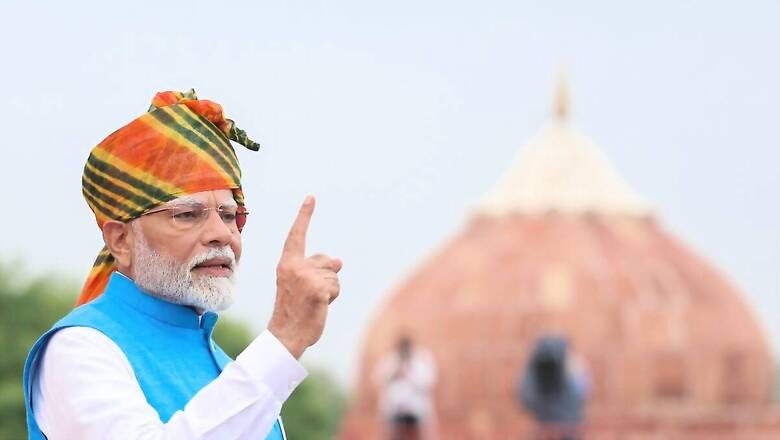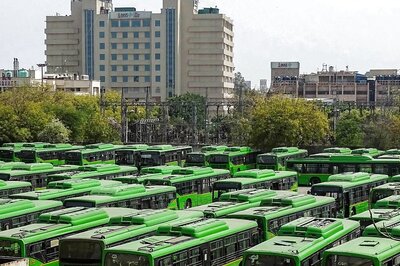
views
Going ahead, the ‘One Nation One Poll’ will be implemented in the tenure of this government, sources have told News18. The report of the Ram Nath Kovind Committee is already with the Centre. The Centre could also begin the census exercise soon and has an “open mind” to include caste in the same though no decision has been taken about it, with a discussion being on about the same. The Centre will also take steps to restore statehood to Jammu & Kashmir in the minimum possible time post elections. The reports of 4-5 states on studying contours of a ‘Uniform Civil Code’ are expected in the next couple of months, after Uttarakhand has implemented it.
This follows several decisions taken in the first 100 days of the government which complete on September 17, as Prime Minister Narendra Modi had put bureaucrats on the job before the Lok Sabha elections to draw up plans for the first 100 days. The BJP is clear that the 240-seat verdict for it is also historic as it had left many seats for its allies in a pre-poll alliance and did not contest all 543 seats itself. The NDA allies have won many of those seats, while the Congress itself could not cross 99 seats.
The Big Steps
Infrastructure projects worth Rs 3 Lakh crore have been approved in the first 100 days of Modi 3.0, with the inauguration date fixed for each one of them. This includes the Wadhavan Port in Maharashtra at Rs 76,200 Cr, the next phase of PM Gram Sadak Yojana to connect 25,000 unconnected villages at cost of Rs 49,000 Cr, roads and high-speed road corridors worth Rs 50,600 Cr, new railway lines, development of three new airports, and three metro projects in Bengaluru, Pune, and Thane.
Sources said such high spend on infrastructure will propel job creation, besides the Rs 2 lakh crore PM package to benefit 4.1 crore youth. There are also now one crore ‘Lakhpati Didis’ in the country who are earning Rs 1 lakh a year; 11 lakh of them were distributed certificates in the last 100 days. Other big steps are three crore more houses sanctioned under the PM Awas Yojana, the Unified Pension Scheme, income tax benefits to the middle-class in the budget and 2.5 lakh houses installing solar power.
Farmer-Friendly government
The government is also keen to project that it is ‘farmer-friendly’ as the total PM Kisan Nidhi payout has touched Rs 3 lakh crore so far while Rs 2 lakh crore additional benefit has reached the farmers by way of increase in MSP in the tenure of this government, setting a new record of 120% procurement under MSP which stood at around 33% in the UPA time. The Modi government took this route to benefit farmers rather than the populist route of ‘farm loan waiver’ taken by UPA in the past — and managed to cover input cost of 82% of farmers in India who won less than 2.5 acre of land, thereby making them loan-free.
Sources said it was the opposition which sees PM Kisan Nidhi through the prism of politics while it was a scheme to empower farmers and not a freebie. Another major decision has been to extend Ayushman Bharat benefit to all aged 70 years and above.
Foreign Policy with a Spine
Indian foreign policy has discovered back its spine as the world is now looking at India with hope after Prime Minister Narendra Modi’s trips to Russia and Ukraine in the first 100 days of his government. Modi was also the first Indian PM to visit Austria after a gap of 41 years and Poland after a gap of 45 years while he became the first Indian PM to visit Brunei. India alos hosted more than 120 countries in the ‘Voice of Global South’ summit.
Tightening Laws
One of the biggest decisions in the first 100 days was the enactment of the three new criminal laws by the Union Home Ministry which could make India the most modern criminal justice system soon by cutting down investigation and judicial delays.
The government also declared June 25 as ‘Samvidhan Satya Divas’ to make the youth know about the dark days of the Emergency imposed by the Indira Gandhi government. Sources say the ‘Samvidhan Hate Divas’ is not a political event as the idea is to resolve every year to safeguard the democracy ethos.
The Waqf Amendment Bill was also brought to the Parliament as a means to remove appeasement policies and for better administration and protection of Waqf properties in the country.




















Comments
0 comment